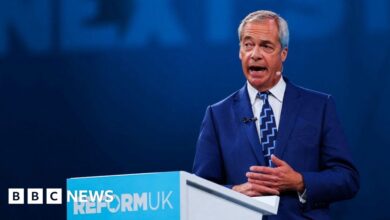Rachel Reeves: Chess fanatic playing Labour’s first big gambit
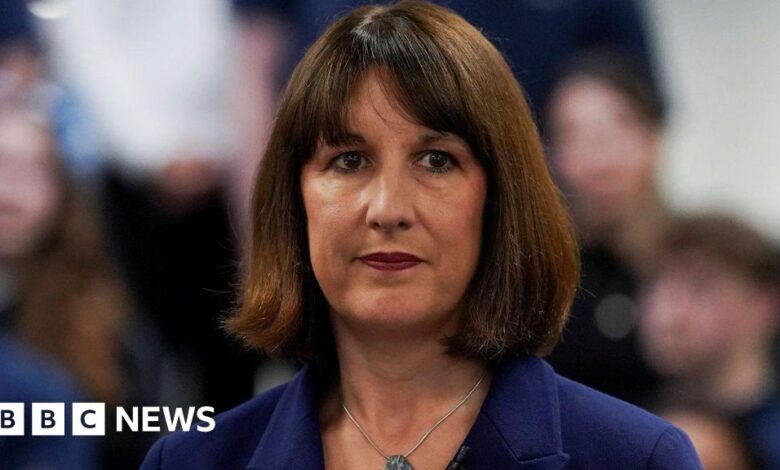
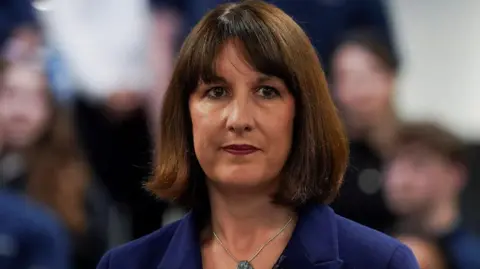 Reuters
Reuters“Serious” and “determined” are words often used to describe Rachel Reeves, the UK’s first female chancellor.
But colleagues and friends have suggested the Labour MP’s public persona does not reflect her human side, with a loud laugh and deep love of Beyoncé tracks.
In her maiden speech in the House of Commons in 2010, she vowed to fight for “jobs, growth and prosperity” – likely centrepieces of Labour’s first Budget in nearly 15 years, on 30 October.
So who is Reeves, and how is she addressing the economic and financial challenges the country faces?
Reeves was born in south-east London in 1979, just months before Margaret Thatcher became prime minister at a time of immense social and economic change.
She has previously told the BBC her mother would tick off items on a bank statement against receipts while sitting at the kitchen table: “We weren’t poor, but we didn’t have money to waste.”
Her parents separated when she was at primary school, and she and younger sister Ellie, also a Labour MP, were shuttled between separate homes.
During the school holidays, the sisters would spend time with their grandparents in the Northamptonshire town of Kettering.
They would be taken to do the rounds of relatives’ houses, who would give them a 20p or 50p piece each. At the end of their week, they were taken to the local toy shop to choose their goodies. While Ellie would spend all her cash, the young Rachel would allow herself a smaller treat and save most of the money.
Decades later, Chancellor Reeves would say that kind of restraint defines her, and she has very much modelled herself on Gordon Brown’s “prudence” in the lead-up to Labour’s 1997 election win.
Chess talent
Reeves played chess from an early age, with her father teaching her the key moves. She became a national under-14 champion, and would “quietly thrash” any boys who might think they were in for an easy game, according to Ellie.
She has credited chess with teaching her “to think ahead, to plan a strategy”.
A keen flute player, she took her music GCSE a year early at Beckenham’s Cator Park School for Girls, a comprehensive, and would go on to gain four A grades at A-level.
Seeing the extent of cuts at her school, where the library had been turned into a classroom and the sixth form consisted of “two pre-fab huts in the playground”, she has said she was politicised by her own experience of public services. At the age of 16, she joined the Labour Party.
She went on to study Philosophy, Politics and Economics at Oxford University. As a student, she would host others before college discos, blasting out Destiny’s Child songs and dressing up in her room.
Rachel Reeves: The basics
Age: 45
Place of birth: Lewisham, south-east London
Education: New College, Oxford and the London School of Economics
Family: Married to Nicholas Joicey, a senior civil servant and former speechwriter to Gordon Brown during his time as chancellor. They have two children. Her sister is Labour Party chair Ellie Reeves.
Parliamentary constituency: Leeds West and Pudsey
 PA
PAAfter graduating, Reeves took on a role as an economist at the Bank of England.
She worked on the central bank’s Japan desk, looking at the country’s attempts to come out of stagnation in the 1990s.
During a secondment to the UK embassy in Washington, she met her future husband Nicholas Joicey, who had spent time as a film critic for newspapers and as a speechwriter to then-Chancellor Gordon Brown.
The path to Parliament was not an easy one though. There were two failed campaigns for the former seat of Bromley and Chislehurst, typically safe for the Conservatives.
Before becoming MP for Leeds West in 2010, Reeves moved to the city and spent time working there for the retail arm of Halifax Bank of Scotland.
She once had an interview for a job at investment bank Goldman Sachs, but turned it down. She said: “I could have been a lot richer.”
Entering Parliament, an early mentor on economic policy was Alistair Darling – the last Labour chancellor, during the financial crisis.
At his funeral last December, Reeves spoke fondly of enjoying lasagne and red wine with him and his wife.
She quickly rose up the party’s ranks, shadowing roles at the Treasury, Work and Pensions, and the Cabinet Office.
Brushes with controversy
While a friend has described her as politically “as hard as nails”, Reeves’ time in Westminster has not been without controversy.
She was accused of “utter hypocrisy” for paying students working in her offices only expenses, rather than a salary. She argued the students were on work placements and getting maintenance support.
Throughout Jeremy Corbyn’s four and a half years as Labour leader, she remained on the backbenches because she felt she could not endorse his policies. Called a “Red Tory” by some in the party, she described this as a “very unpleasant period” in an interview with the BBC’s Nick Robinson.
A former editor of the BBC’s Newsnight programme was forced to issue a written apology to Reeves after calling her “boring snoring” on social media in a post that was meant to be a private message.
While she said the incident was “deeply humiliating”, her key objective after Sir Keir Starmer appointed her shadow chancellor was to portray Labour as a steady, pro-business hand on the economy.
Last October, she admitted she “should have done better” after it emerged some passages in her book, The Women Who Made Modern Economics, had been lifted from other sources without acknowledgment.
She told the BBC some sentences “were not properly referenced” and this would be corrected in future reprints. The Conservatives mockingly called her a “copy and paste shadow chancellor”.
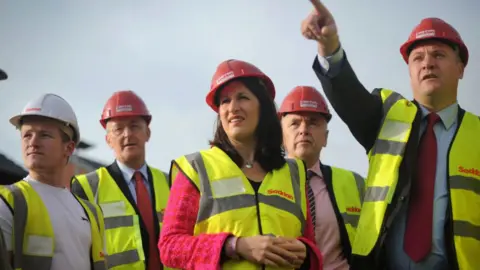 Getty Images
Getty ImagesFollowing Labour’s landslide victory in July’s general election, Reeves was confirmed as the first woman to hold the office of chancellor in its 800-year history.
That was “beyond what a girl like me, from the ordinary background that I came from, could have ever dreamed of,” she recently told BBC Radio 5 Live’s Matt Chorley.
Among a number of early government announcements, she cancelled several infrastructure projects and approved a series of public sector pay rises.
But Reeves will not be delivering her first Budget until the end of October, nearly four months after arriving at the Treasury.
‘Black hole’
Labour argued the time was needed to allow the independent Office for Budget Responsibility (OBR) to properly assess the state of the UK economy. In 2022, Conservative Prime Minister Liz Truss and Chancellor Kwasi Kwarteng had sidestepped OBR scrutiny of their disastrous mini-budget.
But critics said the Budget was the new government’s main lever of change, and that therefore leaving it so long after taking office was a political error.
During the election campaign, Reeves had predicted Labour would inherit the worst economic situation since 1945. In July, she said a spending audit had uncovered a £22bn “black hole” in the public finances left by the previous government.
The Conservatives cried foul and accused Labour of not telling voters the truth about its intention to put up taxes.
During that campaign, independent analysts such as the Institute for Fiscal Studies observed that ruling out increases in income tax, National Insurance and VAT would severely limit Reeves’ room for manoeuvre in the Treasury.
Government sources have told the BBC the chancellor is now looking for tax rises and spending cuts totalling £40bn in the Budget.
One change she announced early was the scrapping of winter fuel payments for millions of pensioners not receiving means-tested benefits. It has proved highly controversial.
Another move unveiled ahead of the Budget was to change the way government debt is measured, to free up billions of pounds of extra investment in infrastructure projects such as roads, railways and hospitals.
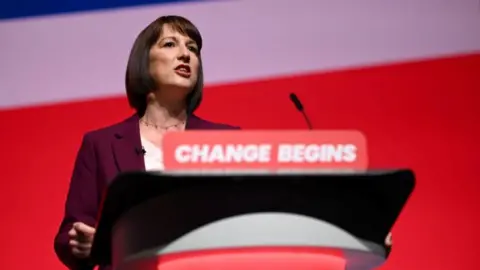 Getty Images
Getty ImagesReeves is determined to remedy the UK’s long-term record of under-investment, setting up a £7bn national wealth fund to encourage private investment in green sectors and repeatedly emphasising the new government’s pro-business credentials.
As she prepares to deliver Labour’s first Budget since 2010, the chancellor has revealed she often chats to a number of senior figures.
“I speak to Gordon [Brown] regularly – I also speak to Tony Blair regularly,” she told Matt Chorley.
Despite their political differences, she also maintains a “good relationship” with Conservative predecessor Jeremy Hunt, she said.
“I may not be particularly impressed with the state of the public finances that he left me, but I do recognise that after Kwasi Kwarteng, he had a tough job to do as well.”
Reeves is politically close to Sir Keir, and also revealed they speak at least once a day, wherever the prime minister is in the world.
But there is a warning from a Labour veteran of the Blair-Brown era, former cabinet minister Lord Blunkett, that she needs to offer the public more hope and less gloom.
He told the BBC Reeves had “been left a terrible hand”, but that “post-Covid, we are a tired nation”, so “more miserableness won’t do”.
He also cautioned that this Budget would probably define the next five years, and that if Labour was going to win a second term, “you have to keep a degree of popularity”. As the Conservatives had found out, he added, “once you’ve lost it, it takes a very very long time to pull it back”.




